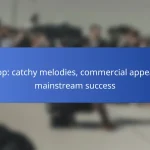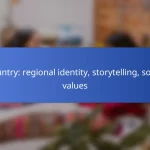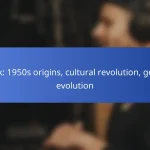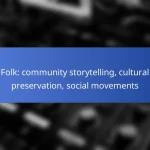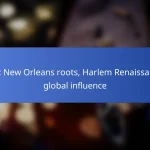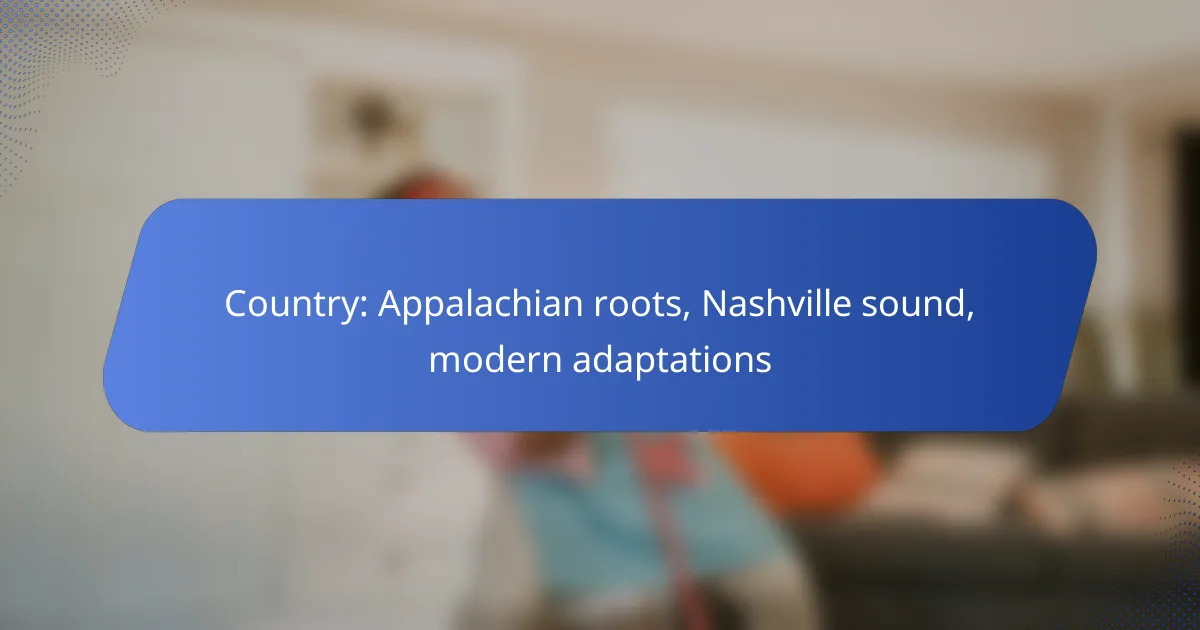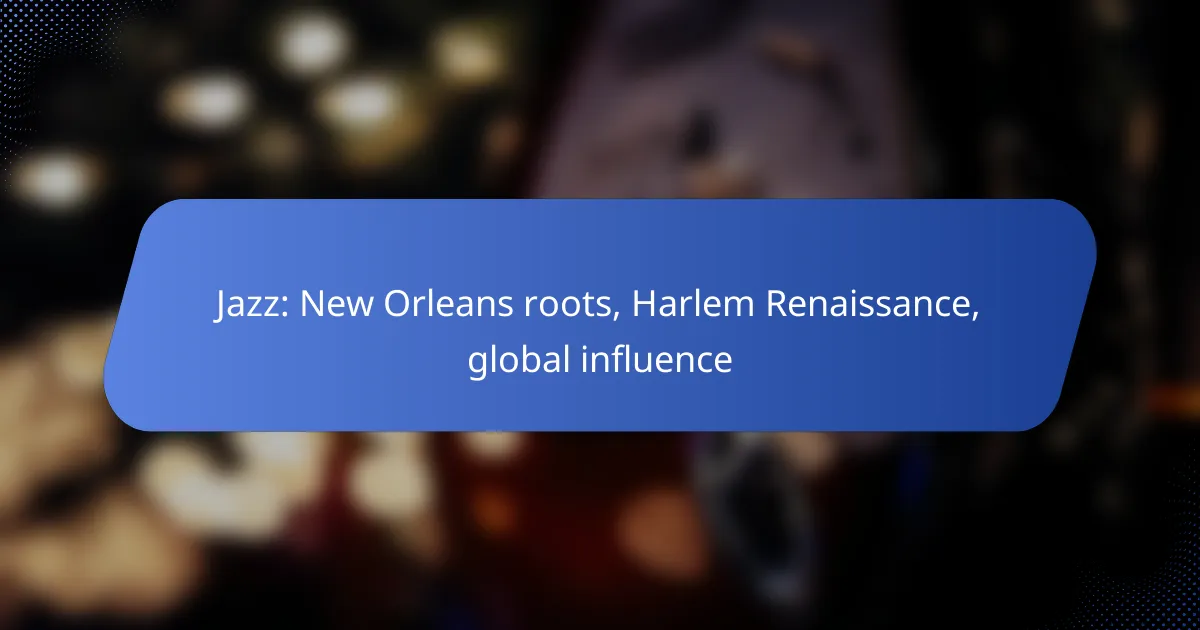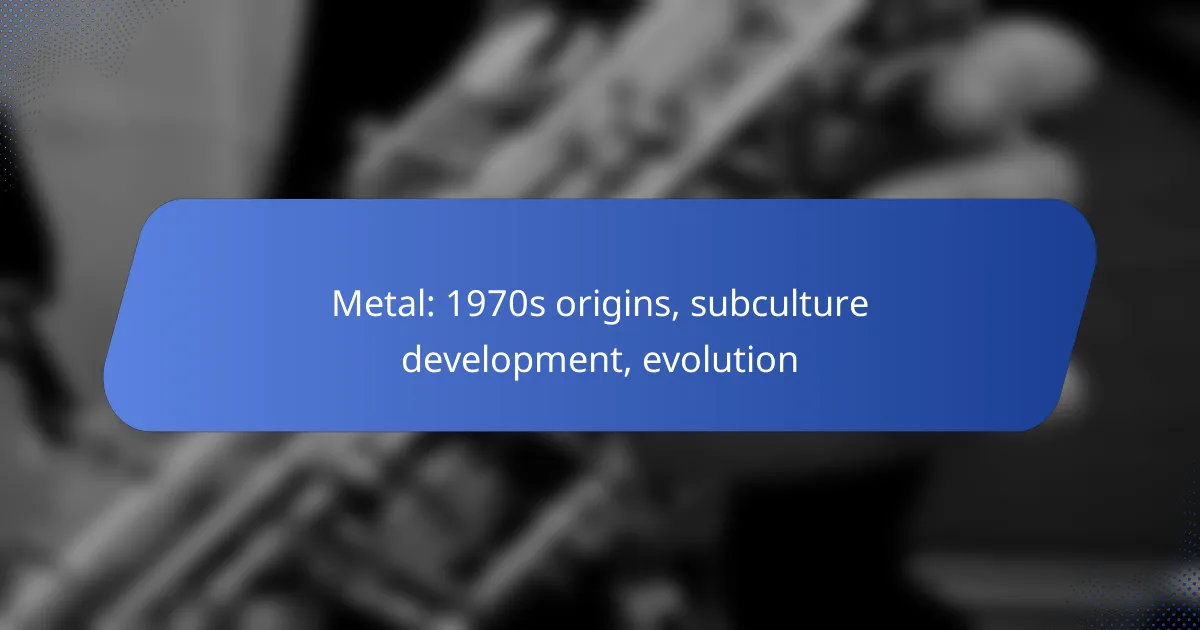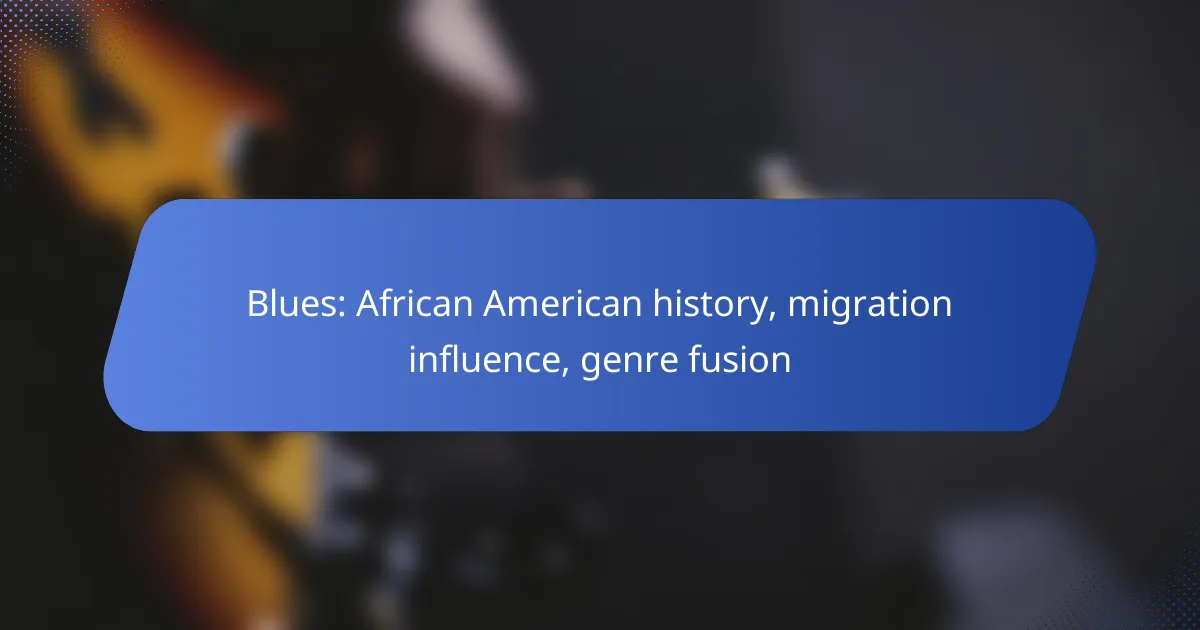The Nashville sound is deeply influenced by its Appalachian roots, which introduce traditional musical elements and storytelling that resonate with audiences. As modern adaptations emerge, this fusion of heritage and contemporary styles creates a dynamic musical landscape, making Nashville a hub for diverse artistic expression. Through community engagement and support for local talent, the city continues to celebrate and evolve its rich musical heritage.
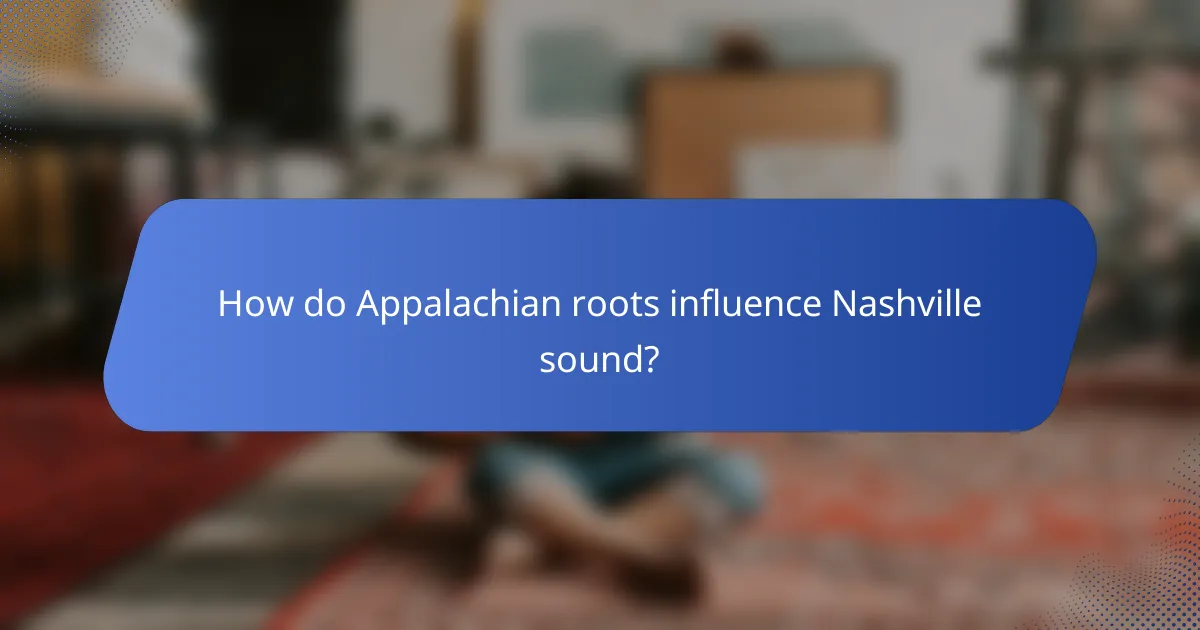
How do Appalachian roots influence Nashville sound?
The Appalachian roots significantly shape the Nashville sound by infusing it with traditional musical elements, storytelling techniques, and cultural authenticity. This blend creates a rich tapestry of music that resonates with both historical significance and modern appeal.
Historical connection to folk music
The Nashville sound draws heavily from the folk music traditions of the Appalachian region, where songs often reflect the struggles and joys of everyday life. This historical connection is evident in the use of acoustic instruments like banjos and fiddles, which are staples in both folk and country music.
Many artists in Nashville incorporate folk melodies and themes, preserving the storytelling aspect of Appalachian music. This continuity helps maintain a cultural link between past and present, allowing newer generations to connect with their heritage.
Integration of bluegrass elements
Bluegrass music, which originated in the Appalachian region, plays a crucial role in shaping the Nashville sound. The fast-paced rhythms and intricate harmonies characteristic of bluegrass are often woven into Nashville recordings, enhancing their musical complexity.
Instruments such as the mandolin and upright bass are frequently featured in Nashville songs, showcasing the bluegrass influence. This integration not only enriches the sound but also appeals to audiences who appreciate the technical skill involved in bluegrass performances.
Impact of traditional storytelling
Storytelling is a fundamental aspect of both Appalachian music and the Nashville sound. Songs often narrate personal experiences, social issues, or historical events, creating a deep emotional connection with listeners. This narrative style is a hallmark of country music, making it relatable and impactful.
Artists in Nashville frequently draw on traditional storytelling techniques, using vivid imagery and relatable characters to engage their audience. This approach not only honors the roots of Appalachian music but also ensures that the stories remain relevant in contemporary contexts.
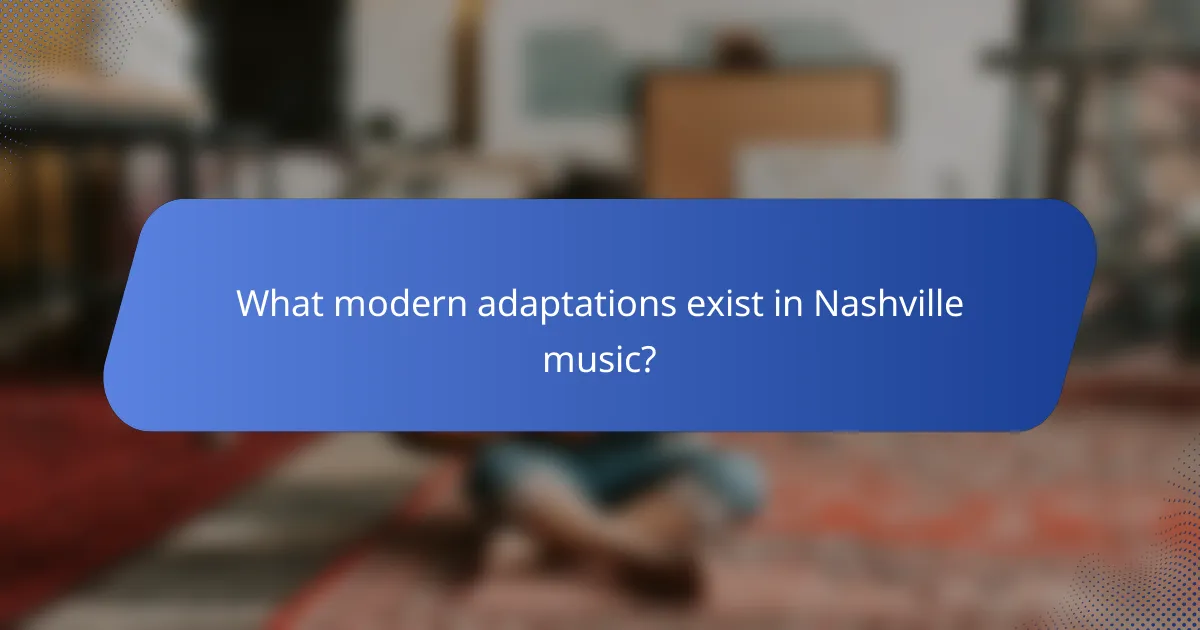
What modern adaptations exist in Nashville music?
Modern adaptations in Nashville music reflect a fusion of traditional Appalachian roots with contemporary styles, particularly through genre blending, technology, and the rise of new artists. These adaptations have reshaped the sound of Nashville, making it more accessible and appealing to diverse audiences.
Blending genres with pop influences
Nashville music has increasingly incorporated pop elements, creating a hybrid sound that appeals to a broader audience. Artists often mix country with pop, rock, and even hip-hop, resulting in catchy melodies and relatable lyrics that resonate with younger listeners.
For example, collaborations between country artists and pop stars have become common, leading to chart-topping hits that showcase this genre blending. This trend not only enhances the musical landscape but also attracts fans from various musical backgrounds.
Use of technology in production
Technology plays a crucial role in modern Nashville music production, allowing for innovative sounds and streamlined processes. Digital audio workstations (DAWs) and advanced recording techniques enable artists to experiment with their music, creating polished tracks that can compete on global platforms.
Moreover, the use of social media and streaming services has transformed how music is marketed and consumed. Artists can reach audiences directly, bypassing traditional gatekeepers, which fosters a more personal connection with fans.
Emergence of new artists
The Nashville music scene has seen a surge of new artists who bring fresh perspectives and sounds. Many of these emerging musicians are influenced by a variety of genres, leading to a more diverse musical environment that challenges conventional norms.
Platforms like TikTok and YouTube have enabled these artists to gain visibility quickly, often leading to record deals and significant followings. This democratization of music allows for a wider array of voices and stories to be heard in the Nashville soundscape.
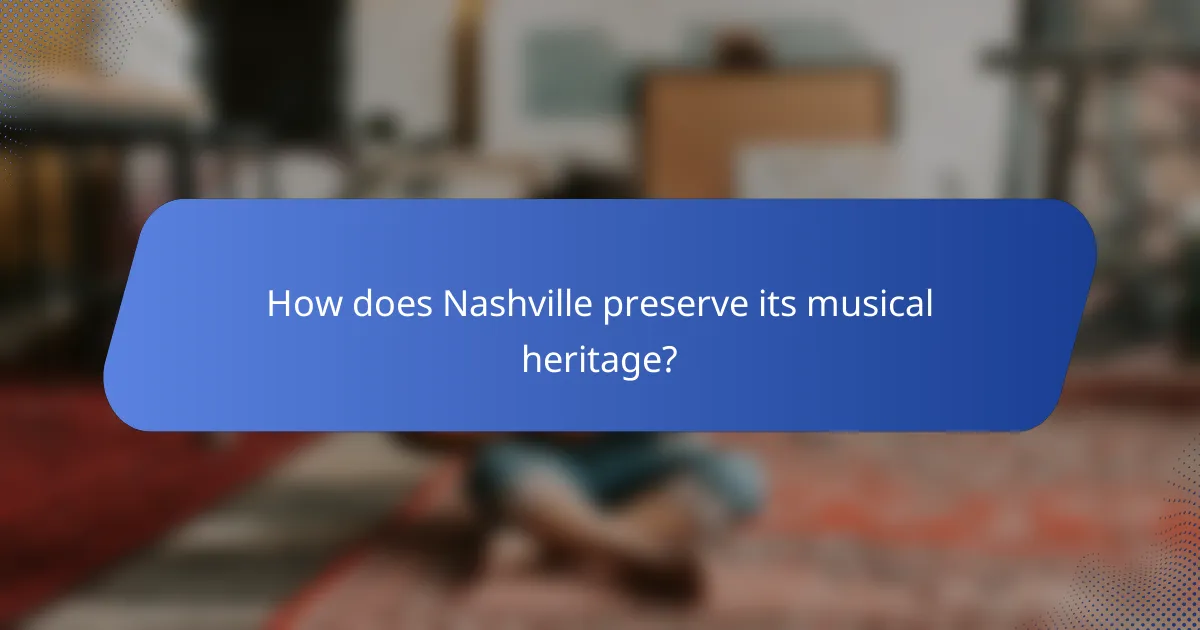
How does Nashville preserve its musical heritage?
Nashville preserves its musical heritage through a combination of dedicated institutions, community engagement, and support for local artists. The city’s rich history in country music is celebrated and maintained via various cultural initiatives and events that highlight its roots and evolution.
Role of the Country Music Hall of Fame
The Country Music Hall of Fame serves as a central hub for preserving Nashville’s musical legacy. It showcases the history of country music through exhibits, artifacts, and educational programs that attract both tourists and locals.
Visitors can explore the stories of legendary artists and the evolution of the genre, making it a vital resource for understanding Nashville’s cultural significance. The Hall also hosts events and performances that keep the music alive and relevant.
Community festivals and events
Nashville hosts numerous festivals and events that celebrate its musical heritage, such as the CMA Fest and the Americana Music Festival. These gatherings not only showcase performances by established artists but also provide a platform for emerging talent.
Community involvement is crucial, as local residents participate in organizing and attending these events, fostering a sense of pride and connection to the city’s musical roots. Such festivals often feature workshops and panels that educate attendees about the history and future of country music.
Support for local musicians
Nashville actively supports local musicians through various initiatives, including grants, mentorship programs, and performance opportunities. Organizations like Music City Music Council work to promote local talent and provide resources for artists to thrive.
Venues across the city often host open mic nights and showcases, allowing new artists to gain exposure. This support system helps maintain the vibrancy of Nashville’s music scene and ensures that its heritage continues to evolve with fresh voices and perspectives.
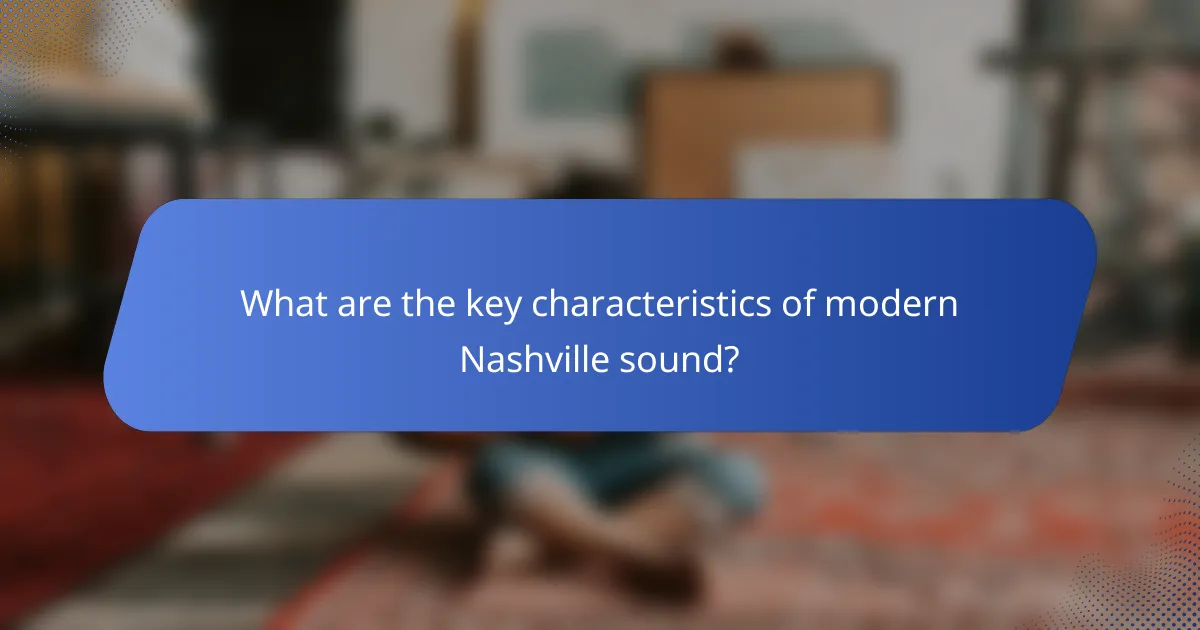
What are the key characteristics of modern Nashville sound?
The modern Nashville sound blends traditional country music with various contemporary influences, creating a fresh and dynamic genre. Key characteristics include a fusion of styles, a focus on storytelling through lyrics, and collaborations with a diverse range of artists.
Fusion of country and hip-hop
The fusion of country and hip-hop is a defining feature of the modern Nashville sound. Artists like Lil Nas X and Kane Brown have successfully merged these genres, attracting a broader audience. This blend often includes rhythmic beats and rap verses alongside traditional country instrumentation.
This cross-genre collaboration has opened doors for new sounds and styles, allowing country music to evolve while maintaining its roots. Fans appreciate the innovative approach, which keeps the genre relevant in today’s music landscape.
Emphasis on lyrical storytelling
Lyrical storytelling remains a cornerstone of the Nashville sound, with artists focusing on relatable themes and personal narratives. Modern songs often explore topics like love, heartbreak, and life experiences, resonating deeply with listeners.
This emphasis on storytelling enhances the emotional connection between the artist and the audience. Many contemporary country songs feature vivid imagery and detailed narratives, making the lyrics memorable and impactful.
Collaborations with diverse artists
Collaborations with artists from various genres have become increasingly common in the Nashville scene. Country musicians frequently team up with pop, rock, and even R&B artists, creating unique blends that attract diverse fan bases.
These partnerships not only broaden the appeal of country music but also introduce new influences and ideas. Successful collaborations, such as those between Maren Morris and Zedd or Florida Georgia Line and Bebe Rexha, showcase the versatility and adaptability of the modern Nashville sound.
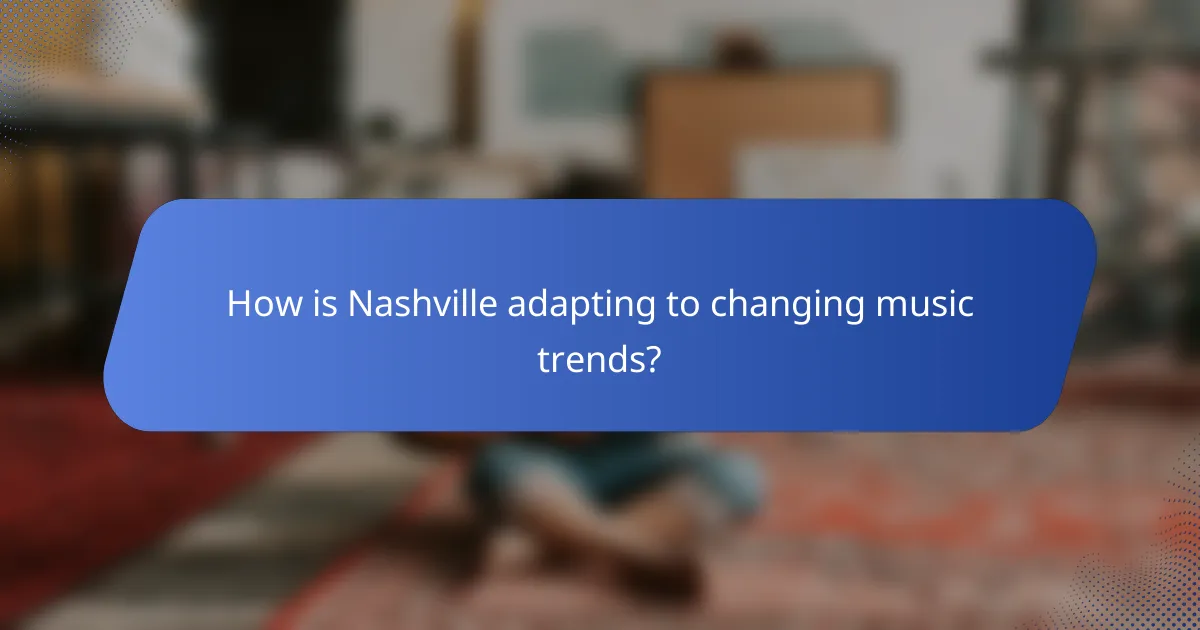
How is Nashville adapting to changing music trends?
Nashville is evolving by embracing new music trends through technology, live events, and global outreach. These adaptations help maintain its status as a music hub while catering to modern audiences.
Incorporation of streaming platforms
Nashville artists and labels are increasingly utilizing streaming platforms like Spotify and Apple Music to reach wider audiences. This shift allows musicians to distribute their music more efficiently and gain insights into listener preferences.
Many local artists now release singles directly on these platforms, often bypassing traditional album formats. This strategy not only reduces production costs but also enables quicker feedback from fans.
Focus on live performances
Live performances remain a cornerstone of Nashville’s music scene, with venues hosting a variety of acts from emerging talents to established stars. The city’s iconic venues, like the Grand Ole Opry, continue to attract large crowds, enhancing the live music experience.
Artists are now incorporating interactive elements into their shows, such as social media engagement and audience participation, to create a more immersive experience. This focus on live events helps artists build a loyal fan base and generate additional revenue through ticket sales and merchandise.
Engagement with global audiences
Nashville is actively reaching out to global audiences by collaborating with international artists and incorporating diverse musical styles. This engagement broadens the appeal of Nashville’s music beyond traditional country roots.
Festivals and events that celebrate global music influences are becoming more common, providing platforms for cultural exchange. By embracing these collaborations, Nashville artists can tap into new markets and expand their listener demographics.
